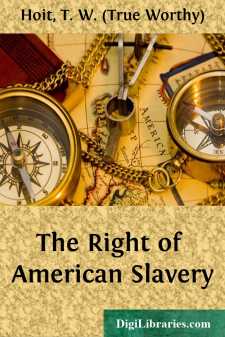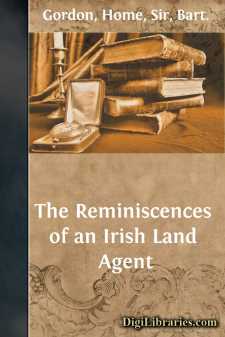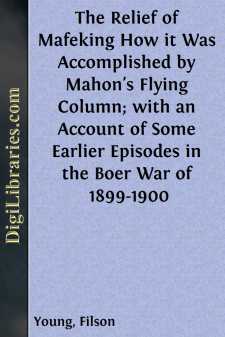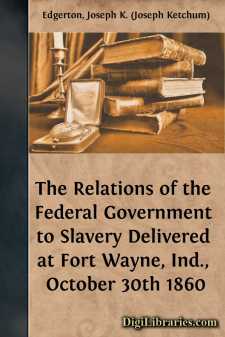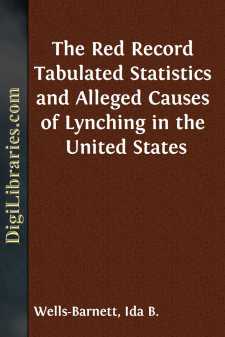History
- Africa 30
- Americas (North Central South West Indies) 50
- Ancient 68
- Asia 58
- Australia & New Zealand 8
- Canada 41
- Caribbean & West Indies 1
- Civilization 20
- Eastern Europe 12
- Europe 310
- Expeditions & Discoveries 60
- General 77
- Historical Geography 1
- Jewish 9
- Latin America 3
- Medieval 8
- Middle East 13
- Military 248
- Revolutionary 8
- Study & Teaching 5
- United States 353
- Western Europe 56
- World 13
History Books
Sort by:
THE RIGHT OF SLAVERY. INTRODUCTION. African Slavery is, at present, the subject of all-absorbing interest to the American mind; for, our people, almost intoxicated with their own freedom, seem unsatisfied with those manifold blessings acquired by the labors of their sires; and while they are conscious of not excelling them in wisdom, virtue, or valor, they are becoming ideal, and seem willing to...
more...
CHAPTER I ANCESTRY 'My father and mother were both Kerry men,' as the saying goes in my native land, and better never stepped. It was my misfortune, but not my fault, that I was born at Bath and not in Kerry. However, my earliest recollection is of Dingle, for I was only three months old when I was taken back to Ireland, and up to that time I did not study the English question very deeply,...
more...
by:
Filson Young
HOW THE RESERVES CAME UP From a seat in the paymaster's office of the depôt barracks at Bury one afternoon in November, 1899, I could look either into the barrack yard or out along the Bolton Road. A four-wheeler clove its way through the crowd surrounding the gates, and the sentries presented arms to it. It contained my friend, the paymaster, who presently came upstairs carrying a bag in which...
more...
The publication at this time of a speech of the Presidential Canvass of 1860, may seem uncalled for, and be imputed to other than the motives that influence me. I nevertheless submit it to the candid consideration of the public, and especially of such as having heretofore entertained wrong views on the chief question involved in the canvass of 1860 and the position of the lamented Douglas, may desire...
more...
INTRODUCTION. The memory of no English sovereign has been so execrated as that of Mary Tudor. For generations after her death her name, with its horrid epithet clinging round it like the shirt of Nessus, was a bugbear in thousands of Protestant homes. It is true that nearly 300 persons were burnt at the stake in her short reign. But she herself was more inclined to mercy than almost any of her...
more...
INTRODUCTION James Anthony Froude was born at Dartington Rectory, the youngest son of the Archdeacon of Totnes, on April 23, 1818. His father was a clergyman of the old school, as much squire as parson. In the concluding chapter to his History of England, Froude wrote that "for a hundred and forty years after the Revolution of 1688, the Church of England was able to fulfil with moderate success the...
more...
LOVING'S BEND From San Antonio to Fort Griffin, Joe Loving's was a name to conjure with in the middle sixties. His tragic story is still told and retold around camp-fires on the Plains. One of the thriftiest of the pioneer cow-hunters, he was the first to realize that if he would profit by the fruits of his labor he must push out to the north in search of a market for his cattle. The Indian...
more...
'They were men whose fathers were men'TO make it clear how Major Wilson and his companions came to die on the banks of the Shangani on December 4, 1893, it will be necessary, very briefly, to sketch the events which led to the war between the English settlers in Mashonaland in South Africa and the Matabele tribe, an offshoot of the Zulu race.In October 1889, at the instance of Mr. Cecil...
more...
ST MARY'S ISLE When the Ranger stole into the firth of Solway she carried an exultant crew. From the cliffs of Cumberland she might have been mistaken for a trading bark, lined and crusted by long travel. But she was something else, as the townsfolk of Whitehaven, on the north-west coast of England, had found it to their cost. Out of their harbour the Ranger had just emerged, leaving thirty guns...
more...
THE CASE STATED The student of American sociology will find the year 1894 marked by a pronounced awakening of the public conscience to a system of anarchy and outlawry which had grown during a series of ten years to be so common, that scenes of unusual brutality failed to have any visible effect upon the humane sentiments of the people of our land. Beginning with the emancipation of the Negro, the...
more...


